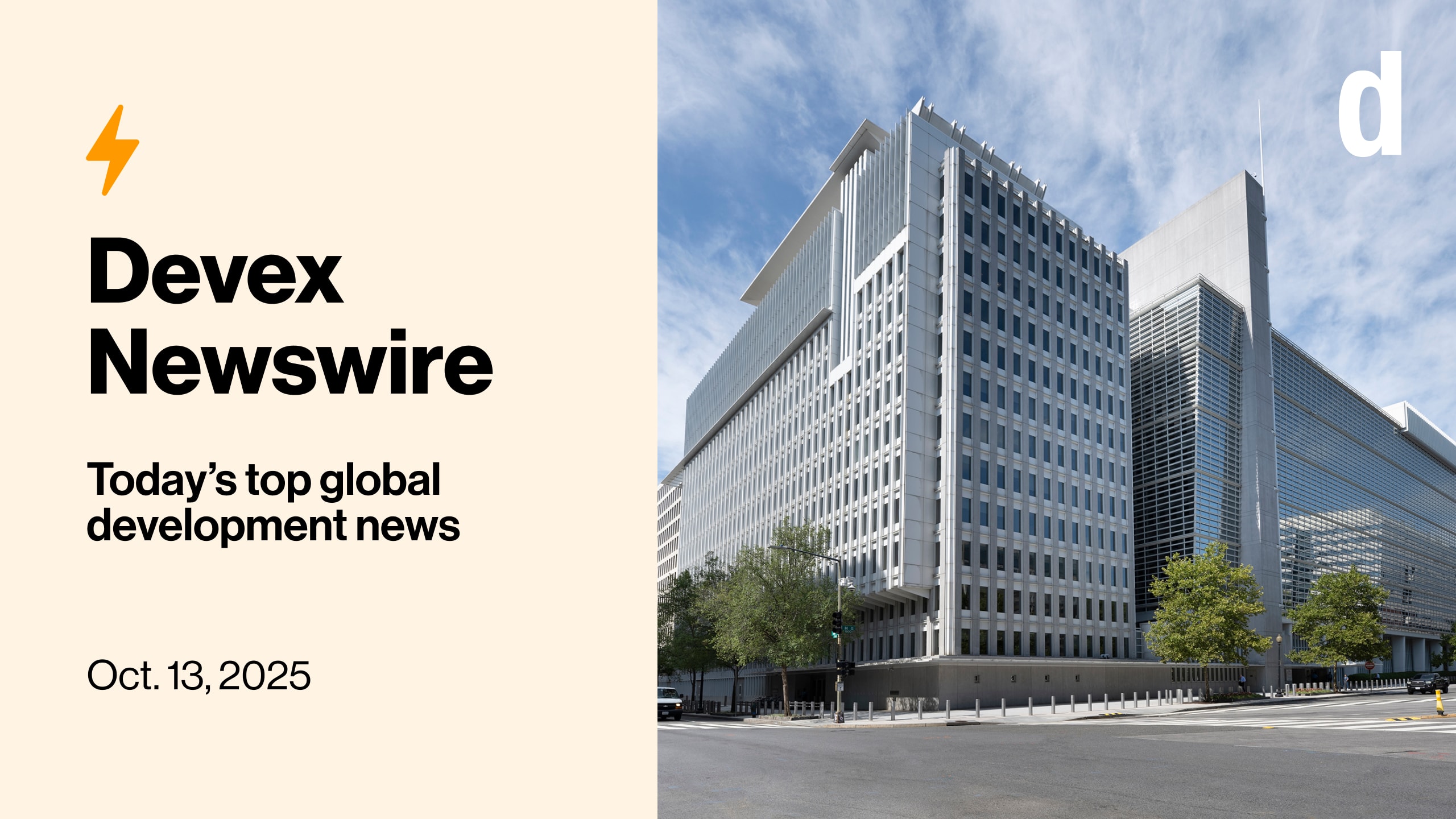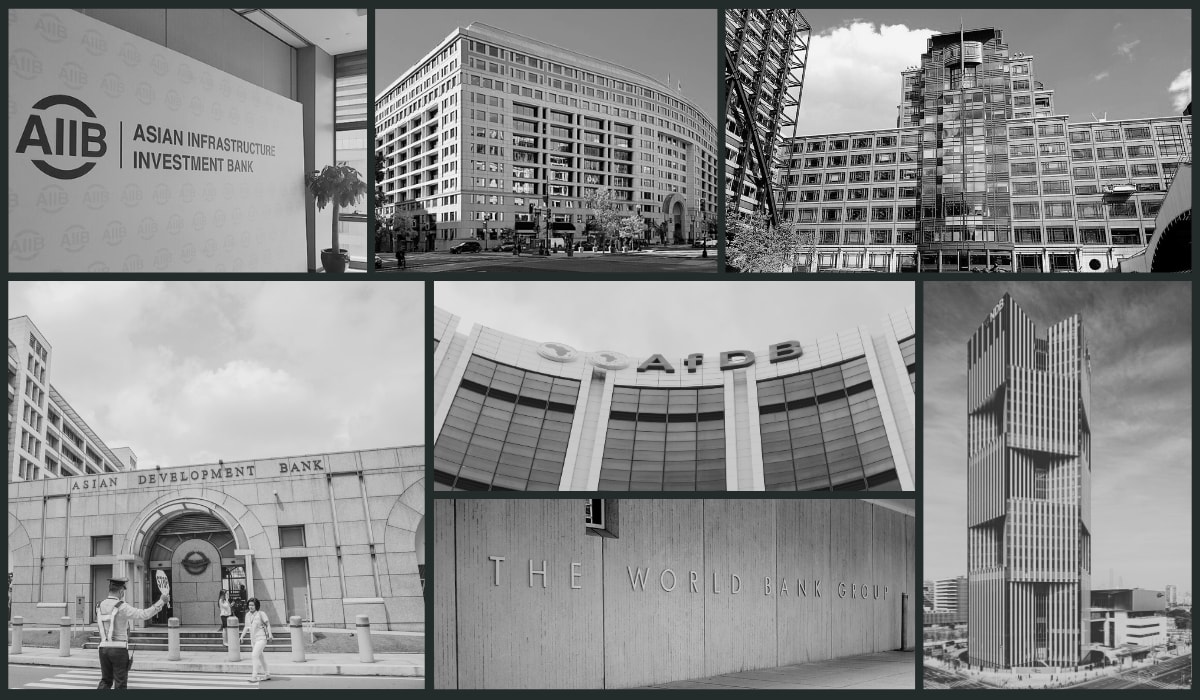Sponsored by Pivotal

As thousands gather for the World Bank and International Monetary Fund annual meetings, they find institutions at a crossroads. In one direction, a global financial system revamped for ending poverty in the age of climate change. In the other, a desperate fight for resources and a retreat from multilateral cooperation.
Oh yeah, and that big election in just a couple weeks.
Also in today’s edition: We break down the biggest stories to watch at this year’s annual meetings, where politics and aid budgets loom large — and where development leaders get one more shot to lock in progress before uncertainty takes the wheel.
This is a preview of Newswire
Sign up to this newsletter for an inside look at the biggest stories in global development, in your inbox daily.
+ Join us on Thursday, Oct. 24, for Devex World: Our flagship event where visionaries from across global development come together in one place to address pressing issues in the sector will be held in person this year in Washington, D.C. Get your tickets now.
The view from above
The World Bank and its multilateral development bank, or MDB, friends are undergoing their biggest overhaul since the Bretton Woods institutions were founded 80 years ago. It’s nothing short of an existential challenge.
The next year or so “will determine whether MDBs and their shareholders can successfully adapt the MDB model to 21st century challenges or if new institutions must be conceived and created,” write Nancy Lee and Samuel Matthews at the Center for Global Development.
The stakes are bigger than these banks though. It’s about whether they can play a part in updating a global financial system that needs to unlock trillions of dollars in grants, low-interest loans, and private investment for lower-income countries in the next five years to keep development and climate goals alive.
For that to happen, governments with the power to drive change will have to stop tripping over their own political problems.
Instead, they are often “turning up at these moments hoping someone else is going to foot the bill and themselves ending up as accidental, chaotic, incoherent cutters of financing, not as intentional investors. And it can't go on,” longtime aid advocate Jamie Drummond tells me.
+ Are you at the World Bank and IMF annual meetings this week and want to connect? Email me at michael.igoe@devex.com.
5 big things
If you are looking for the definitive rundown of what is in play at this week’s meetings, my colleague Adva Saldinger has you covered.
Here are the big-ticket items:
1. Plumbing: For World Bank President Ajay Banga, the work of building a bigger, better bank isn’t all glitz and glamor. Under Banga, the bank has shortened its project timeline from 19 to 16 months and cut the indicators on its corporate scorecard from 150 to 22. Expect more on how efficiency and streamlining can help the bank deliver on its mission.
2. Money: That Washington, D.C., humidity is dropping but the bank is still sweating — its balance sheet. The MDBs could be lending hundreds of billions more with the capital they have on hand, according to the credit rating agency Fitch. We’ve seen incremental progress here — 19% loan-to-equity ratio down to 18% for the World Bank — but advocates aren’t declaring mission accomplished.
3. Debt: The world’s poorest and most climate-vulnerable countries are spending twice as much on debt as they are receiving in climate finance. That’s a problem, but solutions are moving slowly … very slowly. Don’t expect major breakthroughs on the debt agenda this week, but do expect to hear more about a “Bridge proposal” that could help debt-burdened countries free up resources.
4. Climate: As soon as the dust settles from these annual meetings, we’re on to Baku, Azerbaijan, for the United Nations climate summit — COP29. And since Baku has been billed as the “finance COP,” this week’s meetings in Washington could send a “big political signal” about how to “break the impasse” over the chasm between climate finance needs and available resources, says Rob Moore, associate director at E3G.
5. Collaboration: “An additional important ongoing step in Evolution is deepening the work of MDBs as a system,” Jay Shambaugh, under secretary for international affairs at the U.S. Treasury Department, said in a recent speech. Expect to hear more about how collaboration between the World Bank and IMF, among MDBs, and with the private sector can help the whole be greater than the sum of its parts.
Read: 5 things to watch at the World Bank-IMF annual meetings
🎧 Listen: A look ahead to the World Bank annual meetings
Trump cards
Ajay Banga is playing his U.S. election cards close to the vest — so close that he claims not to be holding any cards at all.
“It's actually not a topic at our senior leadership meetings or even in private conversations, because there's no point speculating on something when you don't know what the outcome will be,” Banga told reporters last week. Must be nice!
Everywhere other than the fourth floor of the World Bank, the U.S. election is inescapable.
“Every hallway conversation will be about what these two different paths mean for multilateralism. That’s kind of a daunting overhang,” Clemence Landers at the Center for Global Development tells Adva.
Banga, of course, was nominated for his current job by U.S. President Joe Biden. Before he took the helm of the World Bank, he co-chaired the Partnership for Central America, a public-private partnership led by U.S. Vice President — and Democratic presidential nominee — Kamala Harris. Upon Banga’s nomination, Harris stated that he would be “a transformative World Bank President” and highlighted their close working relationship.
On the flip side, the conventional wisdom is that a second Trump presidency would pose a threat to the Bretton Woods institutions and to multilateralism writ large.
The notorious “Project 2025” conservative policy blueprint — which may or may not have credibility in Trump world — advises that the U.S. plays an “important role” in the World Bank and IMF and should “force reforms and new policies.” But it quickly adds that the U.S. government should also “withdraw from both the World Bank and the IMF and terminate its financial contribution to both institutions.” So there’s that.
But Banga wants you to look at history, not rhetoric — or at least some parts of history. On the now-multiple occasions when he’s been pressed by reporters on the Trump question, Banga has been quick to note that it was during the Trump administration that the World Bank secured its last capital increase.
All the way back in 2017, as president and CEO of Mastercard, Banga described Trump as a “practical and thoughtful person.”
“My view of him, having dealt with him for years, is that at the end of the day he understands the value if you could put it in the terms that makes sense for what he's trying to get done for his administration's policies,” Banga told Reuters last week.
For her part, IMF Managing Director Kristalina Georgieva said last week that her experience working with the U.S. — “any administration — has been always very positive.”
"The U.S. is very pragmatic,” she said. “It brings a can-do attitude. It is demanding, and I like that."
ICYMI: Trump backs away from Project 2025. What does that mean for foreign aid?
Background reading: The Republican plan to ‘rightsize’ US foreign aid in a Trump presidency (Pro)
See also: Top Obama official reflects on Biden, Harris, Trump, and US aid (Pro)
+ A Devex Pro membership offers deeper analysis of the development sector including exclusive funding insights, members-only networking events, and access to the world’s largest global development job board. Try it out today by signing up for a 15-day free trial.
Suit up
Climate activists in hazmat suits will look to set the tone for these annual meetings with a protest at the World Bank’s main entrance today, where they will call on the institution to end its financing of fossil fuel projects.
"The World Bank must prioritize people's interests over the interests of fossil fuel companies. Financing coal, oil, and gas contradicts its mission to combat poverty and promote a sustainable planet,” says Omar Elmawi of Africa Movement Building Space.
Others focused on the climate may be a continent away as the U.N. Biodiversity Conference, aka COP16, kicks off today in Cali, Colombia.
ICYMI: Everything on the table at COP16 (Pro)
Related reading: Ajay Banga’s climate scorecard
On the agenda
As for official events, we’re easing into things on this sunny autumn Monday in Washington, D.C. Time to pick up your annual meetings registration badge and maybe check out the unveiling of the IMF’s “Decades of Delivery” art installation.
For those ready to get down to business, we might bump into you at the Center for Global Development’s fireside chat with Inter-American Development Bank President Ilan Goldfajn, somewhere in the vicinity of Georgieva’s town hall with civil society, or at the Bretton Woods Committee’s event at the IMF this evening.
+ Track how business, social enterprise, and development finance leaders are tackling global challenges by signing up for Devex Invested — our free, must-read Tuesday newsletter.
In other news
Conflict between employees and management has brought chaos to Greenpeace Africa, one of the continent’s highest-profile environmental NGOs. [Climate Home News]
The trial of Anglo-Australian mining company BHP opens today in London. The lawsuit was brought by 620,000 people affected by Brazil’s 2015 Mariana dam collapse, which killed 19 people. [BBC]
A new report estimates that negative stereotypes in media coverage cost the African continent $4.2 billion per year in inflated sovereign debt payments. [The Guardian]
Sign up to Newswire for an inside look at the biggest stories in global development.








